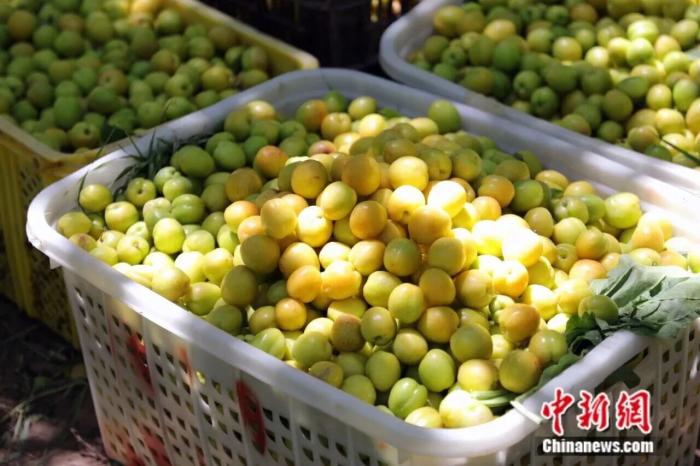Kuqa city in northwest China's Xinjiang Uygur Autonomous Region is known for its apricot production.
Kuqa receives more than 3,000 hours of sunshine annually, while the nearby Taklimakan Desert creates significant temperature fluctuations that benefit apricot cultivation. Intense sunlight increases sweetness and cool nights preserve sugars, creating ideal growing conditions. Snowmelt from the Tianshan Mountains also provides clean, high-quality irrigation.
The city's nutrient-rich soil further supports healthy apricot development. Harvest season begins in late May.
Kuqa apricots are rich in nutrients such as vitamin C, vitamin E, potassium, magnesium, calcium and phosphorus. Traditional medicine uses both the fruit and tree bark to treat coughs, asthma and constipation. Besides, the fruit can be processed into dried apricots, jam, juice and wine.

Apricots from Kuqa are known for their high sugar content. (Photo courtesy of the convergence media center of Kuqa)
The city has developed large-scale apricot production across 97,000 mu (about 6,467 hectares) of dedicated farmland. With 221 fruit-growing cooperatives, the industry generates more than 1 billion yuan (about $140 million) annually from various apricot products.
Each May during harvest season, Kuqa bustles with agricultural activity. Farmers collect the fruit while modern air transport and refrigerated logistics networks distribute apricots to more than 40 Chinese cities. The fruit has become Kuqa's signature product, attracting tourists and supporting local economic growth.
The city hosts related festivals, including the apricot blossom festival and apricot harvest festival, to showcase the fruit's cultural and commercial importance. These events allow visitors to enjoy apricot blossoms, taste the sweet fruit, and immerse themselves in the city's rich history and traditions.
(Source: People's Daily)
